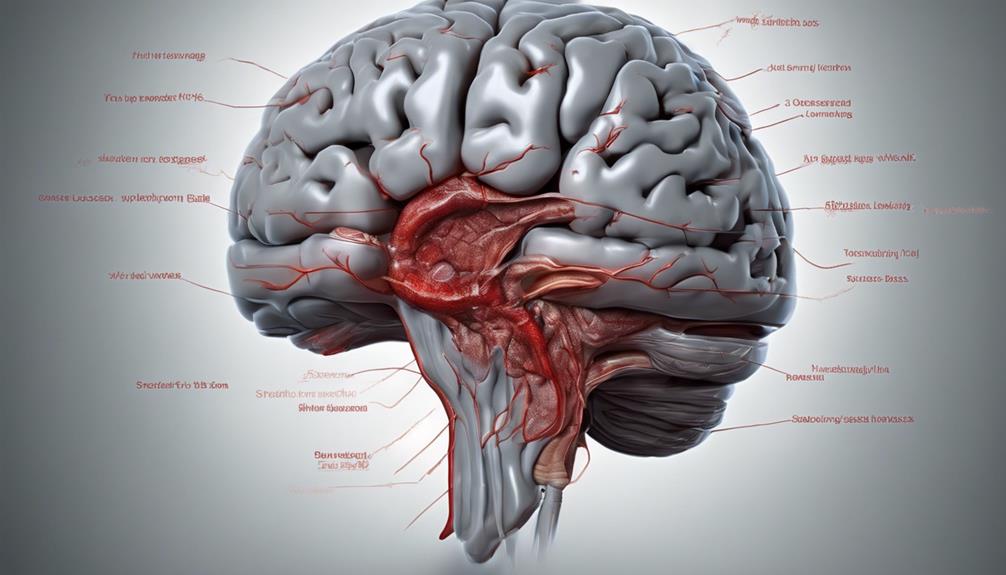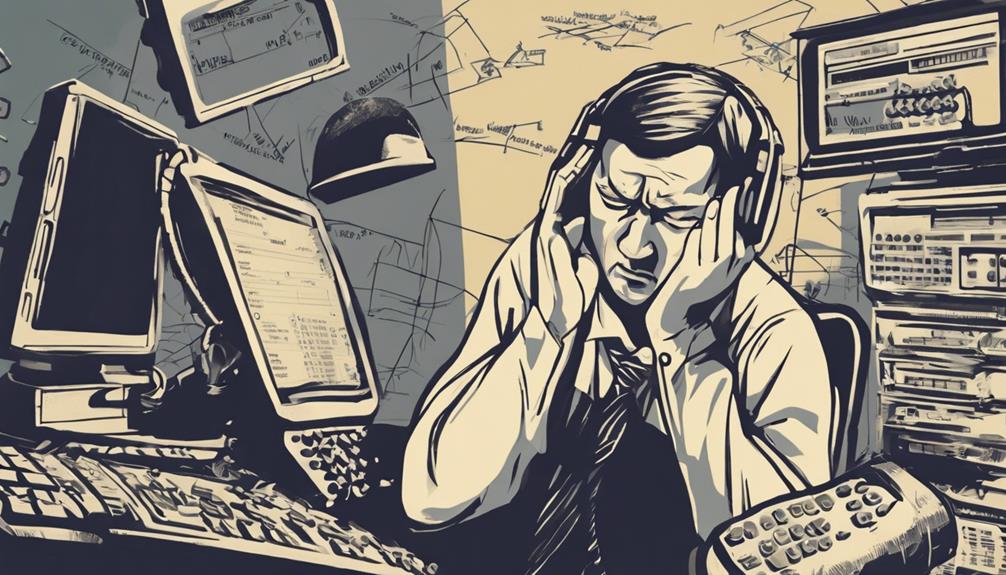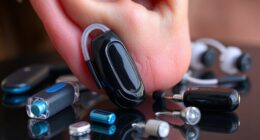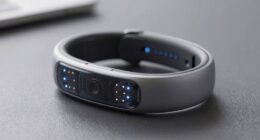Imagine a symphony where the flawless performance is disrupted by a single instrument stopping, causing the entire group’s harmony to be thrown off. In the same way, a stroke can result in a sudden loss of hearing by interfering with the intricate operations of the auditory system.
But how does this seemingly unrelated event lead to a loss of hearing clarity? The answer lies in the intricate connection between our brain, blood supply, and sensory perception.
Let's unravel the mystery behind this unexpected link that ties strokes and sudden hearing impairment together.
Key Takeaways
- Ischemic strokes disrupt blood flow to the inner ear, causing sudden hearing loss.
- Stroke effects on the auditory pathway in the brain can impair auditory processing.
- Sudden sensorineural hearing loss can be an indicator of stroke-related damage.
- Impaired blood supply post-stroke affects the brain's ability to interpret sound signals.

Hearing Aids, Hearing Aids for Seniors with Bluetooth, FSA&HSA Eligible, Rechargeable Hearing Aid with APP for People with Hearing Loss, 5 Levels of Volume Automatic Noise Cancellation, Clear Sound and Easy to Use
Fashionable Appearance : The design is more fashionable and trendy, and it is difficult to notice that it…
As an affiliate, we earn on qualifying purchases.
As an affiliate, we earn on qualifying purchases.
Stroke's Impact on Hearing Function
Strokes disrupt blood flow to the auditory system, causing sudden hearing loss. The intricate network of blood vessels supplying the auditory structures can be compromised during a stroke, leading to a rapid onset of hearing impairment. Ischemic strokes, which stem from blockages in blood vessels, pose a higher risk for sudden hearing loss compared to other stroke types. The temporal lobe, integral to auditory processing, is particularly vulnerable to the effects of a stroke. Damage to this region can result in difficulties with sound recognition and overall auditory function.
Sudden hearing loss can serve as an early warning sign of an impending stroke, highlighting the shared vascular risk factors between these conditions. This emphasizes the importance of prompt medical evaluation when experiencing sudden changes in hearing, as it could signify an underlying issue such as a stroke. Understanding how strokes impact hearing function underscores the need for comprehensive assessments and targeted interventions to address auditory impairments post-stroke.

Pro For Sho 34dB NRR Hearing Protection Ear Muffs – Highest NRR Compact Design Ear Protection for Loud Events & Sensory Use (Grey)
34 dB NRR — Proven, Compact & Trusted for Over 10 Years: Since 2013, we’ve designed sleeker, lighter…
As an affiliate, we earn on qualifying purchases.
As an affiliate, we earn on qualifying purchases.
Mechanisms of Hearing Loss Post-Stroke
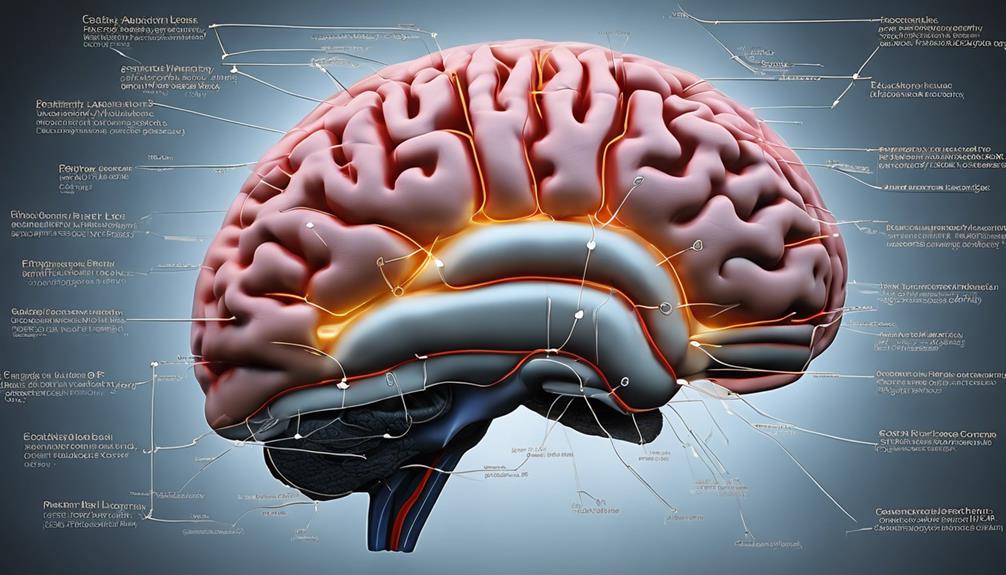
The intricate network of blood vessels supplying the auditory structures can be significantly impacted post-stroke, leading to intricate mechanisms of hearing loss that warrant detailed examination. Ischemic strokes, characterized by blood clot blockages, can disrupt the blood flow to the inner ear, resulting in sudden hearing loss. Additionally, strokes affecting the auditory pathway in the brain can directly cause hearing impairment by damaging the neurological processes responsible for auditory processing.
| Mechanism | Description | Impact |
|---|---|---|
| Ischemic Stroke Effects | Blockages in blood vessels reduce blood supply to the inner ear, leading to sudden hearing loss. | Sudden onset of hearing impairment. |
| Auditory Pathway Damage | Strokes damaging the auditory pathway in the brain can disrupt auditory processing mechanisms. | Impaired ability to interpret sound signals. |
| Neurological Manifestation | Sudden sensorineural hearing loss can be a manifestation of stroke-related auditory system damage. | Acute hearing loss as a sign of stroke. |

Audien Atom One OTC Hearing Aids – Wireless, Rechargeable, and Comfortable | Clear Sound in a Small, Discreet Design for Seniors & Adults with Hearing Loss
Hear What Matters Most: Hearing isn’t one-size-fits-all. That’s why our adjustable frequency system lets you personalize your sound…
As an affiliate, we earn on qualifying purchases.
As an affiliate, we earn on qualifying purchases.
Neurological Effects on Auditory Processing
Upon analyzing the impact of neurological damage post-stroke, a detailed examination of how auditory processing is affected unveils significant disruptions in sound recognition and interpretation. The intricate network of auditory pathways in the brain can be profoundly influenced by stroke-induced brain damage.
Here are five critical points to consider:
- Strokes can disrupt the transmission of auditory signals to the brain, leading to impaired processing of auditory information.
- Alterations in the temporal lobe, which plays a crucial role in auditory functions, can occur as a result of a stroke.
- Impaired blood flow to the auditory pathways due to stroke can contribute to sudden hearing loss.
- Neurological deficits caused by strokes can impact the brain's ability to accurately process auditory information.
- The complexity of auditory processing makes it susceptible to disturbances from stroke-related neurological damage, highlighting the intricate nature of the brain's response to such events.

TGLS Hearing Impaired Women Mens Red Medical Alert ID Bracelet Emergency First Aid Laser Engraved Adjustable Silicone Wristband Bracelet
【MEDICAL ALERT】: Your medical ID bracelet provides quick recognition of your medical conditions, which leads to faster and…
As an affiliate, we earn on qualifying purchases.
As an affiliate, we earn on qualifying purchases.
Preventive Measures Against Stroke-Related Hearing Loss

Incorporating regular exercise into one's routine can effectively reduce the risk of stroke-related hearing loss by promoting cardiovascular health. This preventive measure not only enhances overall well-being but also plays a critical role in maintaining auditory health.
Alongside exercise, maintaining a healthy diet is essential in lowering the chances of stroke, consequently safeguarding against potential hearing issues. Furthermore, effective control of blood pressure is crucial in preventing strokes, which in turn helps protect against hearing loss.
Quitting smoking significantly decreases the risk of stroke, contributing to overall hearing health. Adopting a healthy lifestyle is pivotal, as around 80% of strokes can be prevented through such measures, ultimately benefiting both cardiovascular health and auditory well-being.
Managing Hearing Loss After a Stroke
Detecting and addressing hearing impairments promptly post-stroke is crucial for effective rehabilitation and improved communication outcomes. Managing hearing loss after a stroke requires a comprehensive approach that encompasses various key elements:
- Early Intervention: Prompt identification and treatment of hearing issues post-stroke can significantly impact recovery and communication abilities.
- Regular Monitoring: Continuous follow-ups and monitoring are essential to track any changes in hearing status and adjust interventions accordingly.
- Auditory Assessments: Conducting thorough assessments to evaluate the extent of hearing loss post-stroke is fundamental for tailored intervention plans.
- Rehabilitation Strategies: Implementing specific interventions and rehabilitation techniques can enhance the quality of life for stroke survivors experiencing hearing loss.
- Preventing Complications: Addressing hearing impairments promptly in stroke patients can help prevent further complications and contribute to overall well-being.
Frequently Asked Questions
What Happens in the First 3 Days After a Stroke?
In the first 3 days after a stroke, significant changes occur in the brain due to interrupted blood flow. Brain cells may start to die rapidly, leading to various neurological symptoms.
It's a critical period for immediate medical interventions like clot-busting medication or surgery to restore blood flow. Rehabilitation efforts commence early to help patients recover lost functions and adjust to any lasting deficits caused by the stroke.
What Are the Symptoms of a Stroke Hearing Loss?
We need to understand the symptoms of stroke-related hearing loss.
Sudden deafness in one or both ears, tinnitus, muffled sounds, speech understanding difficulties, trouble in noisy settings, balance issues, dizziness, and vertigo can all indicate potential hearing loss post-stroke.
Recognizing these signs promptly is crucial for immediate medical intervention.
Can You Recover From an Ear Stroke?
Yes, individuals can recover from an ear stroke, also known as sudden sensorineural hearing loss (SSNHL). Recovery varies in timeline and extent among patients, with 40-65% experiencing spontaneous recovery.
Monitoring for signs of an impending stroke is crucial post-SSNHL. Most strokes following SSNHL occur within two years. Comprehensive neurological exams and regular follow-ups post-SSNHL can help monitor recovery and potential stroke risk.
Is Hearing Loss After Stroke Permanent?
Yes, hearing loss after a stroke can indeed be permanent. Damage to the auditory pathways or areas of the brain responsible for processing sound can lead to lasting impairment.
The severity of the hearing loss post-stroke varies based on the extent and location of brain damage. Early identification and management are vital for optimizing recovery and quality of life.
Permanent hearing loss post-stroke underscores the importance of timely intervention and rehabilitation.
Conclusion
In conclusion, stroke can cause sudden hearing loss by disrupting blood supply to the auditory system. Research shows that up to 65% of stroke survivors experience some form of hearing impairment.
Recognizing the signs of hearing loss post-stroke and taking preventive measures can help mitigate the risk of further complications. It's crucial to prioritize cardiovascular health and seek prompt medical attention to address any sudden changes in hearing to ensure overall well-being.

